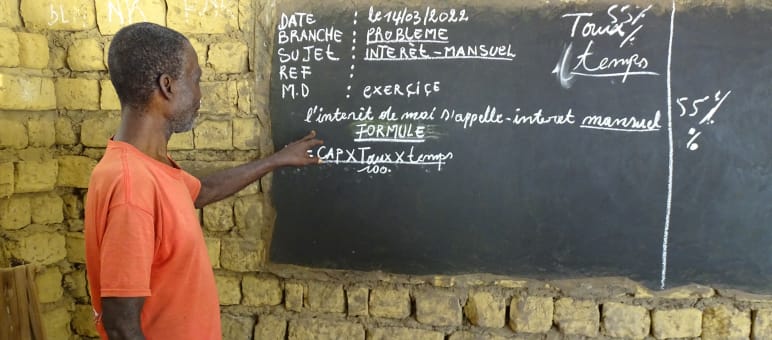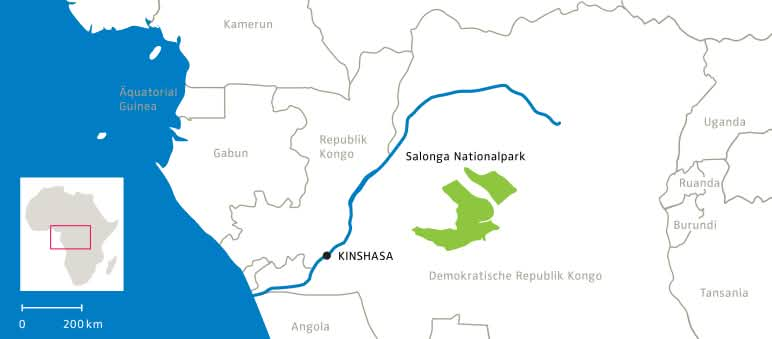Bonobo conservation: fostering trust with a school
Bonobos live deep in the rainforests of the Congo Basin. They are less well known than other great apes, but just as threatened. Scientists founded Bonobo Alive to protect them: The organization fights commercial poaching and supports schoolchildren in three villages on the edge of Salonga National Park so that they too can benefit from bonobo conservation.
Project Overview
Project FocusWildlife / Rainforest Defenders
Project Objective strengthening the protection of bonobos
Activities educational work in villages on the edges of Salonga National Park
Until recently, bonobos were thought to be dwarf chimpanzees – slightly smaller, with pink lips and darker faces. To the untrained eye, the differences are hard to see. Their fundamentally different behavior is certainly better known. While chimpanzees often use violence to resolve conflicts over territory or females, bonobos choose the path of harmony. In other words, sex, not violence. Copulation, not fighting.
The IUCN Red List of Threatened Species classifies bonobos (Pan paniscus) as “endangered”; the population is declining. Commercial poaching, disease and habitat loss are the main threats. Since the species is found only in the Democratic Republic of Congo, the country has a huge responsibility. A particularly large number of bonobos live in Salonga National Park, Africa’s largest protected area and a UNESCO World Heritage Site.
On the edge of the protected area, primatologists led by Dr. Gottfried Hohmann and Professor Dr. Barbara Fruth established the Luikotale and Ekongo research stations, which are staffed by international teams of scientists. A satellite telephone is the only link to the outside world. The best way to get there is by chartered light aircraft. There is no road, and a boat trip would take several weeks.
Leaving the ivory tower of basic research
Fruth, Hohmann and their colleagues left the ivory tower of basic research in 2011. They dedicated themselves to the protection of the animals and founded the organization Bonobo Alive.
The threat to the apes comes not from the villages, but from professional poachers who are not from the area, so a key concern is to involve local communities in the protection of the bonobos so that they too benefit from the conservation work. Environmentalists working in remote, poverty-stricken areas are often asked:
And what are you doing for us people?”
In many cases, they can generate streams of income for local people, who provide cassava, plantains and fruit, and work as cooks, porters and trackers. They are also in demand for their knowledge of medicinal plants, as they know their way around the pristine forest that provides their livelihood.
Bonobo Alive maintains particularly close contact with the villages of Ipope, Mbongo and Bekombo, which are deep in the rainforest and difficult to access. The focus there is on school projects in which Rainforest Rescue has been involved since 2022.
Involving local communities in bonobo conservation
Education is a proven way to engage people in conservation. In addition to imparting knowledge, such projects show that primatologists care about people.
In the first year of our collaboration, eight particularly hardworking boys and girls received financial support for their final exams at the end of their 12 years of schooling – all of them passed the “Examen d’état” and can now attend college or university. Around 500 students from several villages are benefiting from better and more regular pay for their teachers, which boosts their motivation.
The roofs of some school buildings are in poor condition, so Bonobo Alive purchased 500 sheets of corrugated iron and 250 kilograms of nails in Kinshasa for repairs. The materials were trasported by boat to Lokoma and from there to the three villages. A welcome relief, as even the most dedicated teachers and brightest students find it difficult to concentrate when the roof is leaking.
We intend to remain involved in the Congo Basin for the long term and would be grateful if you could support our work with a donation.


